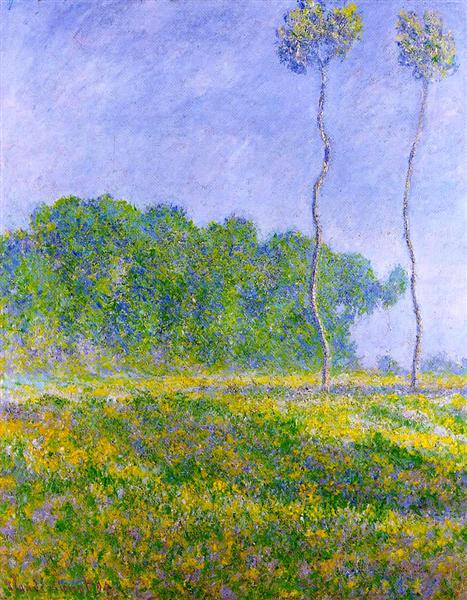Popis
Claude Monet's painting "Spring Landscape" created in 1894 is a work that encapsulates the essence of Impressionism, an artistic movement that Monet himself helped define and popularize. In this work, Monet delves into the depiction of nature with a vivacity and dynamism that challenges the traditional stillness of the landscape. The image, whose composition is rich and enveloping, presents us with a growing field during spring. The color palette is delicate and nuanced, with soft greens and light tones that evoke the freshness and lightness of the season predominating.
The work unfolds through a distinctive treatment of light and colour. Through his technique of loose, rapid brushstrokes, Monet captures the light playing across the landscape and highlights the variation in the hue of the grass and leaves. The application of paint feels light and almost ethereal, suggesting the movement of wind through the vegetation. Here, nature is not presented as a static background, but as a living, vibrant and constantly transforming entity, offering a sensory experience that invites us to become part of the scene.
There are no human characters in this composition, allowing the landscape to become the undisputed protagonist of the work. This absence of human figures highlights Monet's focus on the relationship between humans and nature, a recurring theme in his work. Attention to the landscape becomes a way of connecting the viewer with the essence of nature in its purest and most beautiful state. Monet, in this context, becomes an observer of the beauty that surrounds him, conveying his own wonder and appreciation for the natural world.
"Spring Landscape" represents a period in Monet's career where his style was consolidating and evolving towards greater abstraction. His interest in variations in light and how these affect the perception of colour and form is reflected here with remarkable mastery. Monet was a pioneer in the exploration of emotive and sensorial responses to light and colour, and this work is set at a time when his technique was increasingly stripped of the rigidity of the academic framework that dominated the art of his time.
Monet's work is not limited to aesthetic representation; it also invites us to reflect on nature itself and our connection to it. His dedication to capturing the fleeting moments of spring aligns with his interest in the subjective perception of the landscape. The "vibration" of the painting, its light touched by the brightness of the sun and the movement suggested by the brushstrokes, make "Spring Landscape" a poetic representation of the cycle of life and the rebirth that spring brings with it.
Through this work, one feels the echo of a moment that is both artistic and existential. Behind the apparent simplicity of a spring landscape, Monet reveals the complexity of human emotions and art. "Spring Landscape" stands as a testament to Monet's mastery and his unique ability to capture the essence of nature through impressionism, a legacy that continues to inspire artists and art lovers alike. His unique look at a world full of color and light continues to resonate in the realm of contemporary art, reminding us that in every landscape there is a story, an emotion and a moment of beauty worth contemplating.
KUADROS ©, a famous painting on your wall.
Hand-made oil painting reproductions, with the quality of professional artists and the distinctive seal of KUADROS ©.
Painting reproduction service with satisfaction guarantee. If you are not completely satisfied with the replica of your painting, we will refund 100% of your money.

